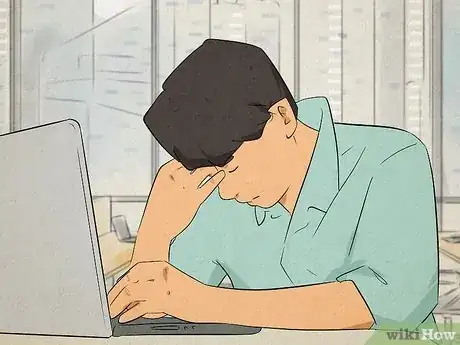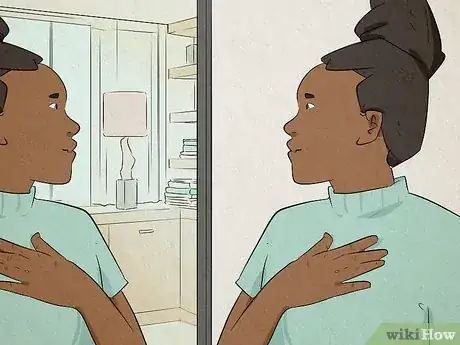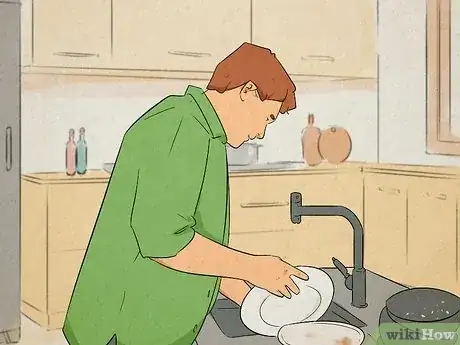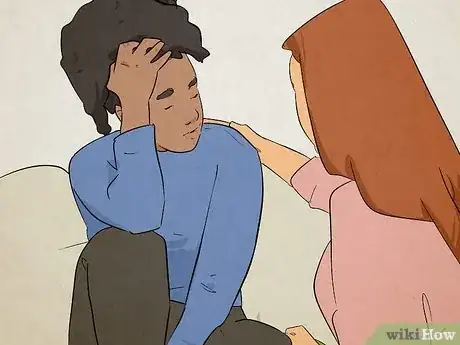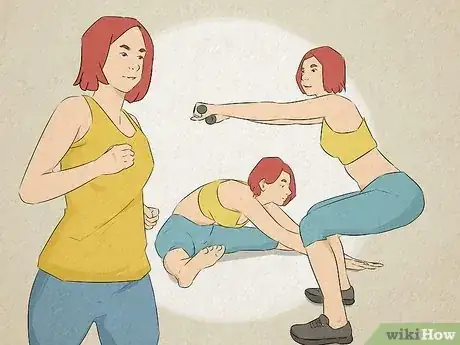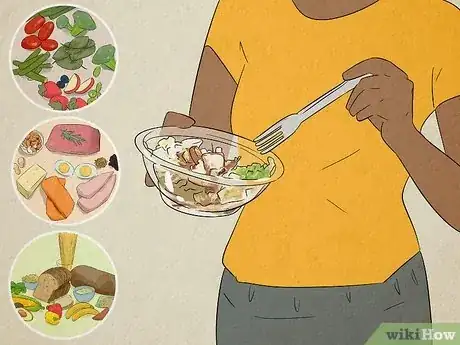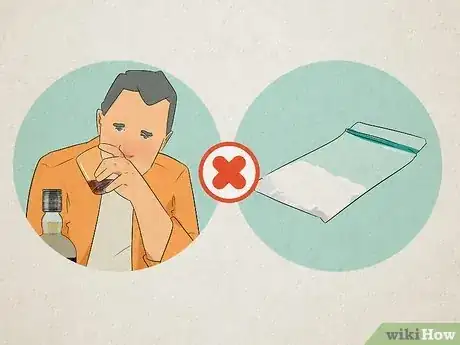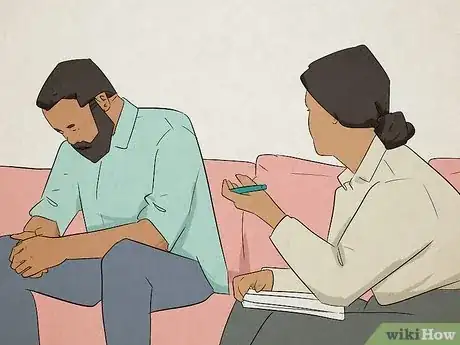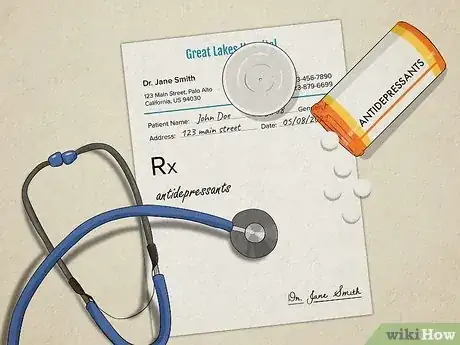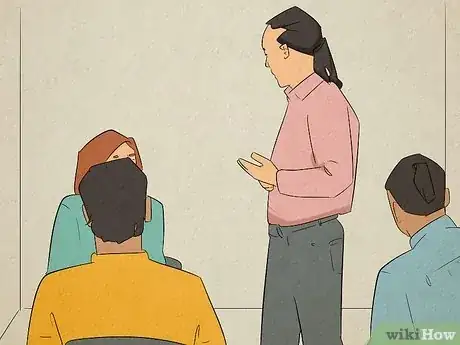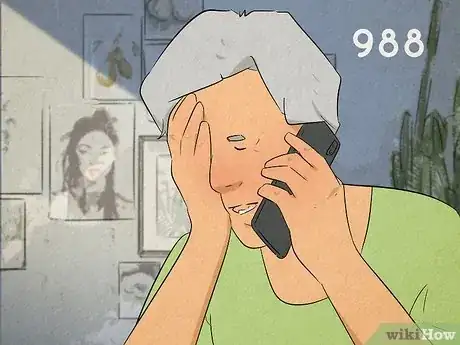This article was co-authored by Liana Georgoulis, PsyD. Dr. Liana Georgoulis is a Licensed Clinical Psychologist with over 10 years of experience, and is now the Clinical Director at Coast Psychological Services in Los Angeles, California. She received her Doctor of Psychology from Pepperdine University in 2009. Her practice provides cognitive behavioral therapy and other evidence-based therapies for adolescents, adults, and couples.
There are 12 references cited in this article, which can be found at the bottom of the page.
This article has been viewed 42,150 times.
Hopelessness is a debilitating feeling. It’s difficult to improve your mood or situation when you feel like there’s no point in trying. However, taking action is the only way to start feeling better, and even small changes can have a big impact on your mood.[1] You can start fighting your feelings of hopelessness by breaking the cycle of negative thoughts. After that, take small steps towards building a healthy, mood-boosting lifestyle. In addition, seek treatment if you think you may be dealing with mental illness.
Steps
Breaking the Cycle
-
1Understand hopelessness. Before you can break the cycle of any negative emotion or feeling, it is important to understand what the term means. Hopelessness is an emotion which is typically characterized by a lack of hope, optimism, and passion. A person who is experiencing the emotion of hopelessness will often have no expectation that their future will improve or get better.
- A person who is feeling hopeless may also have low-self esteem, low self-worth, feelings of powerlessness, have increases in isolating behaviors, and feelings of helplessness.
- A person who is feeling hopeless may exhibit moods that are dark and low. They may also lose interest in prior activities, events, people or objects they once found enjoyment in, or they may not value things which were important to them before.
- Hopelessness is very closely linked to poor mental, cognitive, emotional, and physical health.
-
2Recognize hopeless thoughts and statements. It’s important to recognize when you or someone around you is feeling hopeless. Some examples of hopeless thoughts you may have, or statements you may hear a friend or loved one who is experiencing feelings of hopelessness make, are:
- There is no future for me.
- It will never get better.
- No one and nothing will be able to help me.
- I’ve already given up.
- I am a lost cause.
- I have no hope.
- I will never be happy again.
Advertisement -
3Identify where your feelings are coming from. Realize that your feelings of hopelessness may be a symptom of other mental health concerns that may not have been addressed. Additionally, the feelings of hopelessness could also be a result of feeling discouraged, dissatisfied, distressed, or experiencing negative events. Take stock of your life, and think about whether a particular situation is causing you to feel hopeless.
- Loneliness, chronic illness, and low self-esteem are just a few of the common causes of hopelessness.
- Hopelessness is also listed as a symptom for several behavioral and mental health concerns, such as major depressive disorder, anxiety, PTSD, bipolar disorder, substance dependence, and suicidal ideations.[2]
-
4Adjust your view of happiness. Examine your current assumptions about happiness. Ask yourself whether you’re waiting for a new job, a significant other, or some other external influence to make you happy. If so, try shifting your focus to yourself instead. Realize that you don’t need anything outside yourself to feel content with your life.
- Inner happiness can’t come from outer sources. If you aren’t happy now, you won’t be happy when your circumstances change for the better, either.
-
5Find something to appreciate. Even if you feel miserable today, look for something that you can enjoy. It doesn’t have to be big. Insignificant things that you might take for granted are often the easiest to enjoy when you’re feeling hopeless.
- For example, you could take a moment to appreciate the free coffee at work or the wildflowers growing along the side of the road.
-
6Find one thing you can change. Making changes in your life can improve your outlook, but when you’re stuck in the depths of hopelessness, it’s not easy to take action. Start small by identifying just one thing you can do to improve your life. It doesn’t have to be a big change, just something you can do on a regular basis.[3]
- For instance, maybe you could wash your dishes right away after you cook, apply to one job every day, or start going to bed before midnight.
- Hopelessness thrives on the idea that nothing will ever change. Challenging this belief will help you start to feel better.
Building Good Habits
-
1Be present in the moment. Practice being mindful by focusing on the here and now. Notice the sensations you feel in your body and the thoughts that pass through your mind. Don’t judge yourself or worry about the future – just observe. [4]
- Mindfulness can help you separate yourself from your feelings, which makes it easier to respond to them constructively.
-
2Set achievable goals. Making regular progress at something can lift your mood. Set small, manageable goals and work towards them on a regular basis.[5] Don’t give yourself big, overwhelming goals, or you may feel like you’ll never reach them and get discouraged.
- Some good goals to set might include applying for two new jobs or completing one task for work or school every day.
- If you want to set a big goal for yourself, break it down into smaller sub-goals so you can see your progress more easily.
-
3Get social support. Spend time around other people, especially those who care about you. Reach out to your family and friends or meet new people by volunteering in your community. Talk about how you’re feeling instead of bottling it up.[6]
- Don’t isolate yourself, even if you want to be alone. Isolation makes feelings of sadness and hopelessness stronger.
-
4Get moving. Exercise is a powerful mood booster. Aim to get thirty minutes of moderate activity every day. Cardiovascular exercise is best – try going for a walk, run, or bike ride in the fresh air.[7]
- Consistent workouts are better than intense but infrequent workouts, so don’t push yourself too hard.
-
5Eat a clean diet. Stay away from highly processed foods, which can contribute to a low mood. Instead, focus on keeping your blood sugar stable and getting plenty of nutrients. Make vegetables and fruits, lean protein, and whole grains the foundation of your diet.[8]
- Deficiencies in B vitamins and omega-3 fatty acids may be linked to mood problems. If you’re not getting enough of these nutrients in your diet, consider taking a supplement.
-
6Avoid using alcohol and drugs. Mood-altering substances may help you escape your feelings temporarily, but they will only make you feel worse in the long run. When you’re dealing with feelings of hopelessness, it’s best to avoid alcohol and drugs completely.[9]
- If you’re struggling with addiction, help is available. Your national health website is a good place to start looking for recovery resources. In the U.S., you can visit drugabuse.gov to find treatment options.[10]
Dealing with Mental Disorders
-
1Consider whether you may have a mental health disorder. Persistent feelings of hopelessness is one of the symptoms of a mental health disorder. Think about your other symptoms, such as excessive fears or worrying, confusion or loss of memory, detachment from reality, withdrawal from loved ones, trouble understanding and relating to other people and situations, changes in eating or sleeping patterns, or excessive anger, hostility, or violence.[11]
- Hopelessness is linked to major depressive disorder, anxiety, PTSD, bipolar disorder, substance dependence, and suicidal ideations.
-
2See a counselor or a therapist. A mental health professional can help you figure out why you’re feeling hopeless, learn strategies for identifying and coping with negative thoughts, and set goals for the future.[12] Cognitive behavior therapy is one of the most effective treatments for mental illness. It targets a client's negative thoughts and assumptions, and build a person’s self-esteem and sense of empowerment.[13]
-
3Consider medication. Medications aren’t right for everyone, but they’ve helped many people cope with mental illness. Talk to your doctor or a psychiatrist about whether medication is a good choice for you.[14]
-
4Join a mental health support group. If you are suffering from mental illness, it may be beneficial to take part in a support group for people with similar conditions. Such groups offer encouragement, accountability to stick with treatment, and useful coping strategies.[15]
- Ask your therapist for recommendations for support groups in your area.
-
5Seek immediate help for suicidal thoughts. When some people feel hopeless and depressed, they have thoughts of hurting themselves. If you feel suicidal, you need to seek help right away. Taking immediate action can save your life, and ensure that you get appropriate treatment.
- Call your therapist, your local emergency services department, or a suicide hotline, such as the Suicide and Crisis Lifeline at 988.[16]
Expert Q&A
-
QuestionHow can I stop thinking negatively?
 Liana Georgoulis, PsyDDr. Liana Georgoulis is a Licensed Clinical Psychologist with over 10 years of experience, and is now the Clinical Director at Coast Psychological Services in Los Angeles, California. She received her Doctor of Psychology from Pepperdine University in 2009. Her practice provides cognitive behavioral therapy and other evidence-based therapies for adolescents, adults, and couples.
Liana Georgoulis, PsyDDr. Liana Georgoulis is a Licensed Clinical Psychologist with over 10 years of experience, and is now the Clinical Director at Coast Psychological Services in Los Angeles, California. She received her Doctor of Psychology from Pepperdine University in 2009. Her practice provides cognitive behavioral therapy and other evidence-based therapies for adolescents, adults, and couples.
Licensed Psychologist Try keeping track of all of your negative thought patterns and practicing responding to them with alternative responses.
Try keeping track of all of your negative thought patterns and practicing responding to them with alternative responses.
References
- ↑ Liana Georgoulis, PsyD. Licensed Psychologist. Expert Interview. 6 September 2018.
- ↑ Liana Georgoulis, PsyD. Licensed Psychologist. Expert Interview. 6 September 2018.
- ↑ https://www.psychologytoday.com/blog/the-origin-choices/201403/the-only-way-make-positive-change-in-your-life
- ↑ http://www.huffingtonpost.com/lisa-firestone/depression-help_b_4018957.html
- ↑ Liana Georgoulis, PsyD. Licensed Psychologist. Expert Interview. 6 September 2018.
- ↑ https://psychcentral.com/lib/social-support-is-critical-for-depression-recovery/
- ↑ http://www.apa.org/monitor/2011/12/exercise.aspx
- ↑ https://www.helpguide.org/articles/depression/dealing-with-depression.htm
- ↑ https://psychcentral.com/lib/depression-and-substance-abuse-the-chicken-or-the-egg/
- ↑ https://www.drugabuse.gov/publications/principles-drug-addiction-treatment-research-based-guide-third-edition/frequently-asked-questions/where-can-family-members-go-information
- ↑ http://www.mayoclinic.org/diseases-conditions/mental-illness/basics/symptoms/con-20033813
- ↑ Liana Georgoulis, PsyD. Licensed Psychologist. Expert Interview. 6 September 2018.
- ↑ http://www.apa.org/helpcenter/depression.aspx
- ↑ Liana Georgoulis, PsyD. Licensed Psychologist. Expert Interview. 6 September 2018.
- ↑ https://www.adaa.org/supportgroups
- ↑ https://www.healthyplace.com/suicide/suicide-hotline-what-happens-when-you-call/


